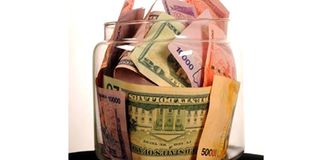Weak Shilling, power tariffs push 2015 average inflation to 5.2%

What you need to know:
Hit. In July, the Shilling was selling in the region of 2,800.
Kampala. The depreciation of the Uganda Shilling against the US dollar and increment in power tariffs have seen the country register increase in its annual average inflation rate of 5.2 per cent for 2015 compared to 4.3 recorded in 2014.
In 2013, Uganda’s annual average inflation rate closed at 5.5 per cent attributed to high inflationary pressure, that year, compared to 2014 and 2015.
Uganda Bureau of Statistics (Ubos) said a weak Shilling and high power tariffs implied that the general public was faced with the problem of mobilising more money to be able to pay for goods and services for their daily livelihood.
Ubos director macroeconomic statistics Chris N. Mukiza, while releasing the Consumer Price Index (CPI), at Statistics House in Kampala last week, said: “The key factors that drove inflation in 2015 were depreciation of the Shilling against the US dollar and the annual energy, fuel and utilities (EFU) due to increase in electricity tariff,” he said.
The annual EFU inflation increased slightly to 12.2 per cent for the year ending December 2015 compared to 12.1 per cent recorded in November.
Dr Mukiza said in October, Uganda Electricity Regulatory Authority increased power tariffs by 17.2 per cent and the depreciation of the Shilling in the months of August and September contributed to a raise in the country’s inflation levels during the year.
From January to December 30, the Shilling depreciated by 17.5 per cent, a development which saw the country’s annual core inflation rise above the policy target levels of controlling Uganda’s core inflation at 5 per cent by Bank of Uganda.
Dr Mukiza said Uganda’s annual core inflation started rising beginning in the second quarter of 2015 as a result of lagged impact of the depreciation of the Shilling.
Speculative traders
Though the country has not significantly witnessed higher prices of goods and service, Dr Mukiza said the business communities in the country have become so speculative regarding pricing of goods and services, which from time to time, have seen them increasing prices anyhow.
“Prices of goods and services in this country, at times, are set without any macroeconomic fundamentals but just on speculations,” he said.
According to Ubos, the annual headline inflation for the year ending December 2015 rose to 9.3 per cent compared to the 9.1 per cent that was recorded at the end of November 2015.
Dr Mukiza said annual core inflation rose to 7.4 per cent in the year ending December 2015 compared to 6.7 per cent for end of November 2015. In the food and the non-food category, Dr Mukiza said, food, which includes food crops and processed foods, registered an annual inflation of 16.5 per cent for the year ending December 2015.
“This is lower than the 17.2 per cent recorded during the year ended November 2015. The annual non-food rose to 5.9 per cent for the year ending December 2015, which is higher than the 5.4 per cent recorded for the year ended November 2015,” he said.
In other goods and services inflation, statistics show that the annual inflation for other goods rose to 8.6 per cent in December compared to the 7.7 per cent recorded for the year ended November 2015.
Similarly, the annual inflation of services increased to 6.4 per cent in December 2015 compared to the 6.1 per cent recorded for the year ended November 2015.
Weak shilling
At the beginning of July last year, experts warned that the Shilling continued depreciation against the dollar could trigger higher inflation pressure.
At the time, the Shilling was trading in the regions of 2,823/2,830.
Speaking then, Bank of Uganda director research Adam Mugume said: “The only danger is that in the short term, the depreciation could induce higher inflationary pressures.”




